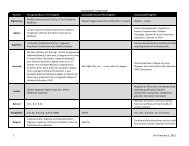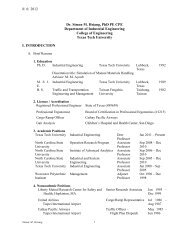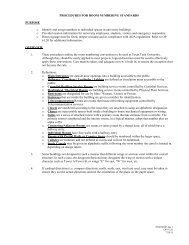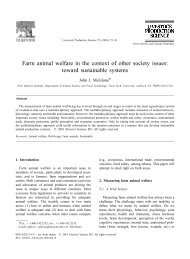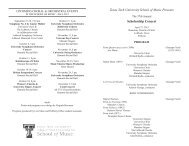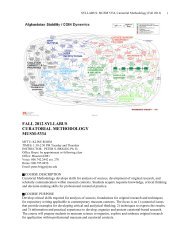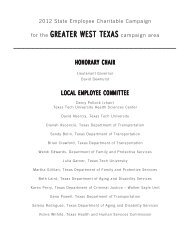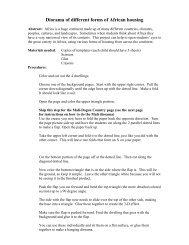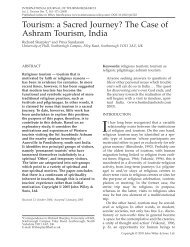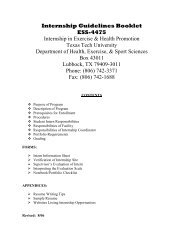Development of Tour Uriely 2005
Development of Tour Uriely 2005
Development of Tour Uriely 2005
Create successful ePaper yourself
Turn your PDF publications into a flip-book with our unique Google optimized e-Paper software.
NATAN URIELY 201<br />
cism, anti-empiricism, intertextuality, and relativity (Bauman 1987,<br />
1992; Denzin 1991; Flax 1990; Frazer 1989; Hollinshead 2002; Ryan<br />
2002; <strong>Uriely</strong> 1997). The tendency to deconstruct modernist-like grand<br />
theories is grasped as part <strong>of</strong> its skepticism and reaction against the notion<br />
<strong>of</strong> a grand design <strong>of</strong> the social system. Thus, unlike grand theories<br />
that conceptualize societies as totalities, postmodern theorizing<br />
emphasizes diversity and richness <strong>of</strong> life (Denzin 1991; Frazer 1989;<br />
Ryan 2002). The inclination <strong>of</strong> the latter to stress the role <strong>of</strong> individuals<br />
to subjectively negotiate the meanings <strong>of</strong> their practices is related to its<br />
notion <strong>of</strong> power. In this respect, power is positively perceived as a constitutive<br />
activity rather than negative by (Frazer 1989). The compromising<br />
nature <strong>of</strong> postmodernist discourse and its tendency to<br />
conceptualize reality in terms <strong>of</strong> relative truths reflects its logic as nondualistic<br />
and anti-hierarchal (Lather 1991). In this regard, Denzin suggests<br />
that postmodern theories are characterized by a compromising<br />
nature that supports ‘‘both-and’’ rather than ‘‘either-or’’ statements<br />
(1991; 27, 151). Similarly, Bauman (1987) suggests that postmodernist<br />
modes <strong>of</strong> analysis are less authoritative, less conclusive, and more pluralized<br />
than modernist systems <strong>of</strong> knowledge. Accordingly, he refers to<br />
postmodernist theorists as interpreters, whereas modernist thinkers are<br />
referred to as legislators.<br />
The attempt made above to clarify the distinction between modernist<br />
and postmodernist theorizing would be incomplete without addressing<br />
the controversy surrounding it in the social sciences. To begin with,<br />
critics <strong>of</strong> the latter address the inconsistent and, in some cases, contradictory<br />
usage <strong>of</strong> the term postmodernism (Giddens 1987; Harvey<br />
1989). In this context, the problematic utilization <strong>of</strong> this term is recognized<br />
even by scholars who promote it. For instance, Bauman suggests<br />
that ‘‘postmodernity means very different things to many different people’’<br />
(1992:vii). Dissidents associate this ambiguity with over-free writing<br />
in which ‘‘anything goes’’ (Antonio 1991; Hollinshead 2002).<br />
Another point <strong>of</strong> criticism concerns the general idea that modernity<br />
has already been replaced by postmodernity. This proposition is challenged<br />
by Giddens (1990) who perceives both as two different forms<br />
Wang (2000:16) refers to the distinction as an analytical device used<br />
to characterize different phenomena <strong>of</strong> the same social order, thus prefering<br />
‘‘late modernity’’ over postmodernity.<br />
An objection to the distinction between modernist and postmodernist<br />
theories is provided by Curry (1991) who suggests that this distinction<br />
reflects an attempt <strong>of</strong> scholars to distinguish their work as<br />
postmodernist, rather than on a fundamental turn from earlier theories.<br />
In this context, he argues that postmodernist thinkers possess similar<br />
limitations to those they associate with the so-called ‘‘modernist<br />
form <strong>of</strong> knowledge’’. For example, postmodernist thinkers, such as<br />
Lyotard and Rorty, are criticized for both being selective in their works<br />
and for ignoring the intellectual complexity and the depth <strong>of</strong> earlier<br />
theories (Curry 1991; Ross 1988). Thus, the attack <strong>of</strong> postmodernist<br />
thinkers against the generalized and universalistic narratives <strong>of</strong> earlier<br />
theories is directed back against their own work. A related challenge<br />
to the distinction between modernist and postmodernist thought



